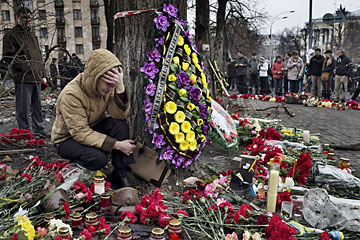
(2 of 6)
But to turn the screws on Putin, Obama may have to assume more risk than he is willing to accept. Ukraine comes with a huge price tag, thanks to a succession of corrupt and inept governments that have left its economy in need of an estimated $35 billion by the end of this year to avoid bankruptcy. Neither Obama nor the E.U. is willing to dole out any largesse and instead urge Ukraine to borrow from the International Monetary Fund (IMF). That money would come with stiff terms, like the removal of subsidies, which would spark new protests against Yanukovych's successor. If the Arab Spring has taught us anything, it is that the public square is fickle. (Yanukovych himself was denied office after a fraudulent vote by the 2004 street protests known as the Orange Revolution, only to be voted back into power little more than five years later.) Although at least 80 protesters died during the violence in Kiev, Obama's appetite for involvement in the crisis will also be limited by the absence of a direct U.S. interest in the outcome--or at least one that he can easily explain to the American voter.
Putin, on the other hand, wants to own the Ukraine problem, and he is willing to pay the price. He has already agreed to give Kiev $15 billion in soft loans as well as cheap natural gas but has frozen the deal while the post-Yanukovych struggles play out. Should Ukraine's next leader be to Moscow's satisfaction, the purse strings will swiftly be loosened. And should Putin care to explain it to his voters, it's an easy sell: a pro-West Ukraine would be anathema to most Russians, much as Americans would recoil at a pro-Russian Canada.
The Russian leader has been remarkably silent on Ukraine, but Foreign Minister Sergei Lavrov described the street protests as the work of Western-backed "extremists" and "radicals." Moscow has also played up concerns for the safety of ethnic Russians in eastern Ukraine, especially on the Crimean Peninsula, a Russian territory until Soviet leader Nikita Khrushchev attached it to Ukraine in 1954. Pro-Russian politicians in Crimea have called on Moscow for protection from the same "fascists."
Such alarm raising is reminiscent of the run-up to Russia's 2008 invasion of Georgia, which Putin framed as Moscow riding to the rescue of Russians in the enclave of South Ossetia. In Ukraine, Putin's forces wouldn't have a long distance to travel. The Russian navy has a massive base in Sevastopol, on the Black Sea, and on Feb. 26, Putin ordered military exercises near the border to prepare for a potential "crisis situation."
Scramble for Spoils
